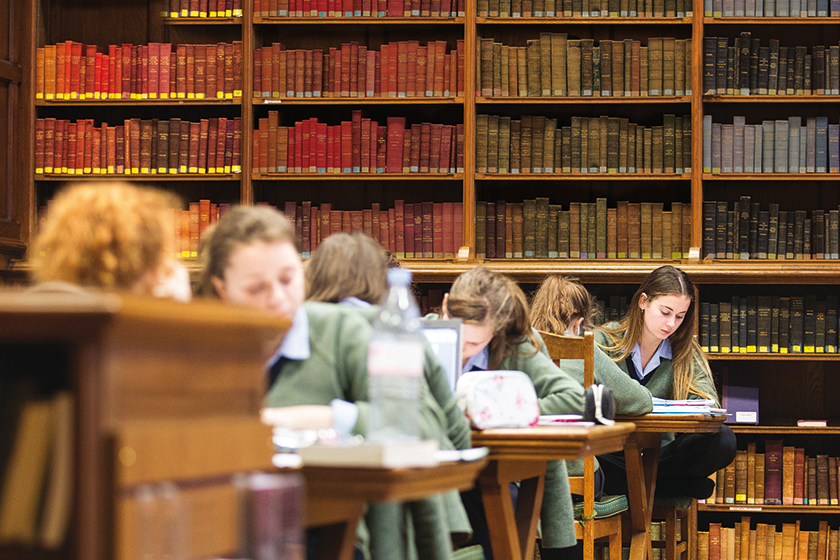A Beginner’s Guide to School Examinations
By
8 years ago
Examinations are milestones, but more options help pupils to choose the system which suits them

From Common Entrance through to sixth form, examinations have traditionally loomed large in the life of a British school child. Yet modern testing is a far cry from the old traditions of learning by rote.
Exams today test for comprehension, interpretation and are designed to detect genuine passion. But nobody is resting on their laurels. Since 2010 the UK examination system has been subject to an ongoing overhaul with obvious and immediate benefits in its rigour, quality and depth of assessment. While much has changed, the essence of a strong and reliable system has been protected.
Senior school entrance
The Common Entrance (CE) is taken at either 11 or 13 and is designed to ensure your child is academically suitable for your preferred school. To take it, pupils must have been offered a place. Pass rates vary from school to school and non-selective schools use the CE as a means of guidance so that they know how to look after incoming pupils.
To reduce anxiety and identify intelligence rather than just cramming, many top schools have introduced the pre-test, which is taken between the ages of ten and 12, using verbal and non-verbal reasoning, maths and English, with an interview and references.
CE papers (and pre-tests) are set by the Independent Schools Examination Board (ISEB) but marked by individual schools. The ISEB reports its exams being taken by pupils from 402 prep schools across 50 different countries, with papers routinely sent abroad. The curriculum is constantly refined – 11-plus science papers will be updated in 2018. Changes are reported online.
Scholarship papers are tougher. In 2011, applicants, aged 13, for one of Eton’s 14 annual King’s Scholarships, had to write a script for a TV broadcast defending the killing of 25 protesters by the army after sending in the troops to quell protests.
GCSEs and iGcses
Once in the school system, children will be prepared for their Key Stage 4 exams, known as GCSEs and iGCSEs, when they are aged 14 to 16. GCSEs are the most common and have been going through revision since 2015.
Exam content for 18 subjects, including English language, literature, mathematics, art and design, computer science and citizenship studies, has been published and introduced into schools. The process has raised standards and made testing more rigorous.
Some British schools prefer the iGCSE (used internationally), for its wide curriculum and because it is considered to be more demanding. Occasionally schools offer their own in-house designed and university-approved exams. Bedales’ BACs (Bedales Assessed Courses) offer ancient civilisation, design and philosophy as well as iGCSEs.
A-levels
The choice of final exams includes a range of interesting and increasingly challenging subjects. Most pupils take A-levels, which have also been reviewed since 2010. Criticism surrounding the issue of falling standards prompted extensive research by the Cambridge Assessment group, and the syllabuses have become academically tougher. Heads like Andrew Halls, of King’s College School, Wimbledon, believe that ‘the A-level will regain its old “gold standard” reputation’.
Cambridge Pre-U
The dip in the A-level’s reputation prompted schools to consider alternatives to protect their competitive edge. In 2008, inspired by a desire to define their most talented students in their university applications, some highly academic schools pioneered the Cambridge Pre-U, including Winchester, Charterhouse, Oundle, Downe House and Dulwich College. The number of schools signing up grows by an annual ten per cent.
The Cambridge Pre-U is linear, has no compulsory principals and can be supercharged with ‘short courses’, consisting of one year’s study. Students who take the Global Perspectives and Research (GPR) course find it enhances their prospect of university admission as it gives real evidence of independent, critical thinking. All Ivy League universities in the USA accept the Cambridge Pre-U.
Other heads prefer the IB, which teaches students to be excellent independent learners and critical thinkers who understand the provisional nature and different forms of knowledge and don’t take everything they read at face value.
It is suitable for all abilities, but also appeals to those seeking a broader education who don’t yet wish to specialise, or who are interested in the connections between disciplines and the philosophical basis of knowledge. IB papers are skills-based, require developed thinking skills, and a high level of application of knowledge and understanding. Dr Michael Walker, former headmaster of Felsted School, Essex, says: ‘The IB is an absolute standard, a world-recognised qualification and increasingly understood and even preferred as a grounding by university admissions tutors’.
Competition and constant review by forward-thinking heads of highly academic and multicultural schools ensure that the British examinations system continues to flourish, offering UK-educated pupils a golden ticket to university and to adult life.




